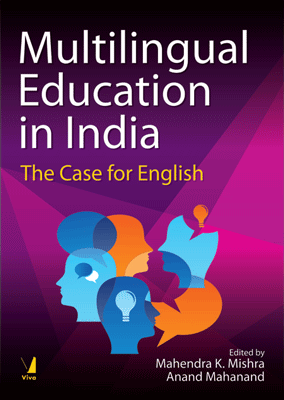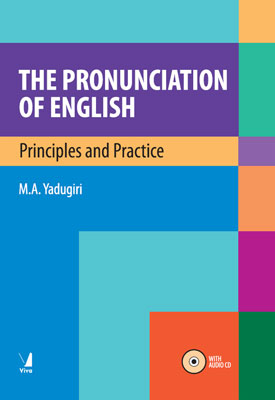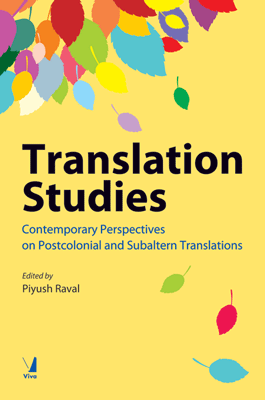Multilingual Education in India: The Case for English
Multilingual Education in India: The Case for English
₹1,165.50 ₹1,295.00 Save: ₹129.50 (10%)
Go to cartISBN: 9788130927633
Bind: Hardbound
Year: 2020
Pages: 316
Size: 171 x 241 mm
Publisher: Viva Books Originals
Sales Territory: Worldwide
Reviews:
“Drawing on theories, practices, and possibilities, the book makes a strong case for integrating English language education into the multilingual context of India.”
—T. Vijay Kumar, Professor of English, Osmania University, Hyderabad
“Bi-/Multilingualism is now a worldwide phenomenon, with very few societal and academic exceptions, and hence, has attracted the attention of researchers all over, and this is a welcome ?movement?. There is indeed a lot to be done to help the innumerable learners and teachers out there, and I wish to be of help to whoever needs it. The very eclectic collection of articles in this work is a testimony to that. I welcome it and congratulate the editors for the effort put in. I hope this extraordinary volume will be welcomed by institutions as well as researchers alike, and will be an inspiration to the uninitiated also.”
—G. Rajagopal, Former Dean, School of English Language Education and Professor, Dept. of ESL Studies, EFLU, Hyderabad
“This volume is an important contribution to not only multilingual education but also the teaching of English in India. All concerned with language pedagogy will certainly find this thought-provoking book very useful.”
—B.N. Patnaik, Former Professor of English and Linguistics, IlT Kanpur
Description:
Multilingualism is a unique cultural and historical feature of India. lndian thinking looked at the world as a family and respected differences and identities. While monolingual nations considered multilingualism a problem, it remained the natural condition for various domains of life in India. In recent times, multilingualism has come to be recognized as an invaluable asset and resource by educationists and policymakers paving the way for a new educational approach that is in harmony with local traditions.
Some perceive English language education as a hindrance to the growth of lndian languages and allege that it causes a social divide. The arguments of this book convincingly correct this uninformed notion and prove that English has been a tool of empowerment and a driver of social and economic mobility. The contributors demonstrate that local languages and cultures can be revived by integrating them into English language education.
Compensating the lack of organized ideas on multilingual education, this book aims to introduce a trendsetting change in the lndian perspective on education. It will be a source of direction for teachers, teacher trainers, policymakers, and those with an interest in education and sociolinguistics.
Target Audience:
This book will be a source of direction for teachers, teacher trainers, policymakers, and those with an interest in education and sociolinguistics.
Contents:
Preface
Acknowledgements
Contributors
Part One: Problematization
Chapter 1: Multilingual and Multicultural India - Debi Prasanna Pattanayak
Chapter 2: India, Tribal Education, and Participating in Crimes against Humanity? - Tove Skutnabb-Kangas
A revised version of chapter 2 is available here
Chapter 3: UN Declaration on Rights of Indigenous Peoples: Applications for MLE from Nepal to India and Beyond - David A. Hough
Chapter 4: Responding to Student Diversity through the Curriculum: A Possible Lead Role for ELT - Jacob Tharu
Chapter 5: Contextualizing English Language Education for the Language Minority Learners - Anand Mahanand
Part Two: Practices
Chapter 6: Multilingual Education in Orissa, India: Constructing Curriculum in the Context of Community and Culture - Mahendra K. Mishra
Chapter 7: Appropriate Education Strategies in Diverse Language Contexts - Dhir Jhingran
Chapter 8: Living the Translanguaging Space: An Emic Perspective - Mohanraj Sathuvalli and Uma Maheshwari Chimirala
Chapter 9: Intercultural Bilingual Education: Peru's Indigenous Peoples? Answer to Their Educational Needs - Susanne J. P??rez
Chapter 10: Using Chain Story Writing in L1 to Improve L2 Writing: An Experiment in a Multilingual Classroom - Suchismita Barik
Chapter 11: What Do Our Teachers Say? A Study on ESL Teacher's Belief on L1 Use in Classroom - Subhasis Nanda
Chapter 12: Integrating Content and Language Teaching to Teach Adjectives in a Tribal Context in Odisha - Arpita Panda
Chapter 13: Cultural Diversity and the Classroom - Ruth Z. Hauzel
Chapter 14: Reading the Role of L1 in the Indian English Classroom - Mahananda Pathak
Chapter 15: Changing Perspectives of Education in North-East India with Special Reference to Tripura - Shyamal Das
Chapter 16: Problems and Prospects of English Language Teaching and Learning in Lakshadweep: The Case of Minicoy Island - P. Abdul Hakeem
Part Three: Possibilities
Chapter 17: ELT in India: Need for a Cap Th at Fits the Head - Jayashree Mohanraj
Chapter 18: An Investigation of the Needs and Incorporation of Study Skills Components in a Multilingual Classroom in India - Amit Kumar
Chapter 19: Teaching English in Multilingual India ? Some Suggestions - Mohanraj Sathuvalli
Chapter 20: Countering the ?Two-Solitude? Instructional Mode in ESL Writing - Lina Mukhopadhyay
Chapter 21: The Alien Context in Teaching English in Indian Classrooms: Some Issues and Practices - Sisirkana Bhattacharya
Chapter 22: Convivial Cross-lingual Evaluation in Multilingual Indian Classrooms: An Exploration of Possibilities - Geetha Durairajan
About the Editors:
Mahendra Kumar Mishra is a well-known folklorist of India. He was State Coordinator for Multilingual Education (1996-2010) in Odisha and the founder of mother tongue-based multilingual education in the primary schools in ten tribal languages of Odisha. His innovations in using community knowledge and folklore in school curriculum have been widely applied in the elementary schools of Odisha and Chhattisgarh.
Dr Mishra has authored many books including Visioning Folklore (2002), Oral Epics of Kalahandi (20071, Oral Poetry of Kalahandi (2008) and translated A.K. Ramanujan's Folktales from lndia and the educational thoughts of Paulo Freire into Odia.
Dr Mishra is the recipient of the State Literary Award (1999) in Odisha and the Veer Shankar Shah Raghunath Shah Award by the Government of Madhya Pradesh (2009) for his lifetime contribution to tribal literature. He was awarded in 2009 by the Kalevala Institute, University of Turku, Finland, for the translation of the Finnish epic The Kalevala into Odia.
Dr Mishra is the founder trustee and member secretary of the Folklore Foundation in Bhubaneswar and Editor-in-Chief of Lokaratna, the e-journal of this foundation published as part of the World Oral Literature Project in (DSpace), Cambridge University.
Presently Dr Mishra is in Chhattisgarh and engaged in the application of folklore and language in tribal education.
Anand Mahanand has been on the faculty of the English and Foreign Languages University, Hyderabad, for nearly 20 years. Apart from his teaching and research at the university, he develops materials and designs syllabi for the learners and teachers of English. He has authored, co-authored, translated and co-edited more than 25 books and developed materials for the English and Foreign Languages University (EFLU), lndira Gandhi National Open University (IGNOU) and Dr B.R. Ambedkar Open University (BRAOU). His major publications include English through Folktales, Real English, English for Academic and Professional Skills and Learning to Learn: Study Skills in English. He has also contributed to the People's Linguistic Survey of lndia (PLSI) and the UGC-E-Pathshala Projects. He is on the editorial board of prestigious International journals such as Studies in ELT, Global Journal of English Language and Literature, Spring Magazine on English Literature and Lokaratna. He has taught courses in English in Multilingual Contexts, guided research projects and published widely in the area. At present he is Dean, Publications, and the All lndia Coordinator of the District Centre Scheme, an outreach project of EFL University, Hyderabad.



